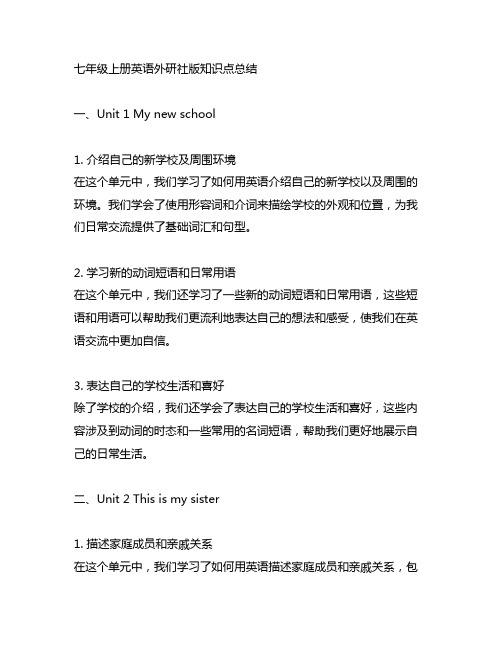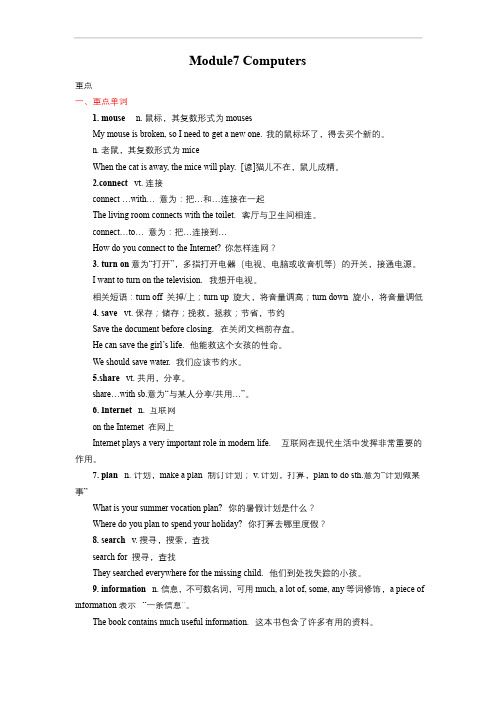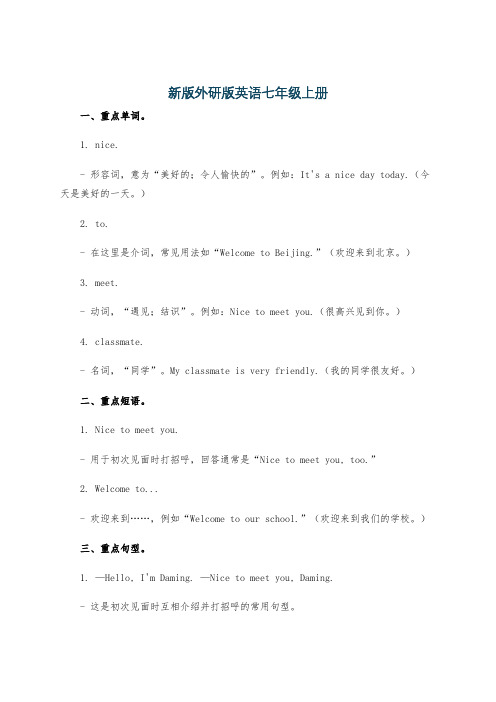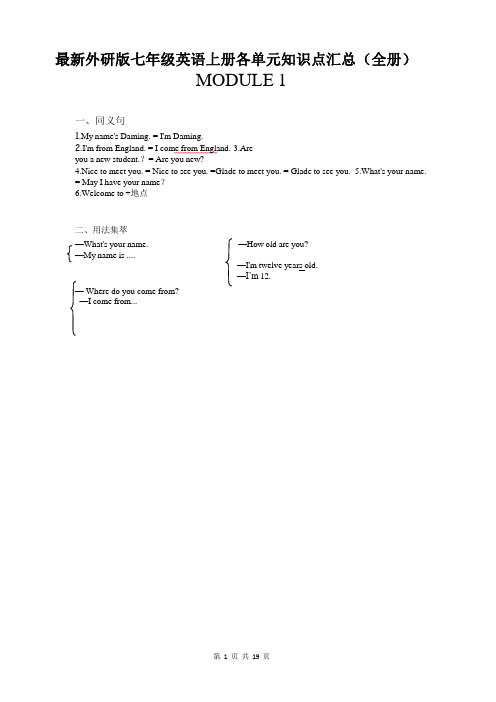最新外研版英语七年级上册知识点总结
Starter知识点 2024-2025学年新外研版英语七年级上册

新外研社七上知识点sb.=somebody 某人 sth.= something 某事;某物 sp.=someplace 某地do代表动词原形 doing代表动词ing形式 to do为动词不定式did 代表动词过去式Starter要掌握的重点内容:名词、数词、冠词、一般将来时、一般过去时、并列连词and/but/or、基本句型1.welcome to + sp.(某地)欢迎来到某地2. a new stage of ... ...的新舞台/阶段learn new subjects 学习新科目3.learn to do sth. 学会做某事learn from sb. 向某人学习learn about sth. 了解某事/某物4.make friends with sb. 和某人交朋友5.be ready for sth. =prepare for sth. 为某事做好准备be ready to do sth. =prepare to do sth. 准备好做某事get prepared = get ready 做好准备6.forget to do sth. 忘记去做某事forget doing sth. 忘记做过某事7.Moral Education and Law 道德与法治education n. 教育→educational adj. 有教育意义的law n. 法律→ lawyer n. 律师rmation Technology 信息技术information 不可数science technology 科学技术9.sports trousers 运动裤 sports jacket 运动夹克sweater 毛衣 coat 外套;大衣 shirt 男士衬衫 blouse 女士衬衫skirt 短裙 dress 连衣裙 school uniform 校服shorts 短裤 pants 裤子 jeans 牛仔裤10.名词短语:a/an + 形容词 +可数名词单数(a grey jacket)形容词+可数名词复数(black shorts)11.一般将来时(simple future tense)句式:肯定:① sb. will do sth. 某人将会做某事如:I will go to junior high school tomorrow.② sb. am/is/are going to do sth. 某人打算去做某事如:He is going to wear a shirt.否定:① will not=won't如:I won't go to junior high school tomorrow.② am/is/are not going to =am not/isn’t/aren’t going to如:He isn’t going to wear a shirt.疑问:① will sb. do sth如:Will you go to junior high school tomorrow?What will you do tomorrow?② am/is/are sb. going to do sth.如:Is he going to wear a shirt?What is he going to wear?表示将来的判定词:tomorrow 明天、the day after tomorrow 后天、tonight/this evening 在今晚、in the future 在未来next year/week/... 明年/下周/下个...in two days/...(时间段) 两天后/...(时间段)后 ...12.有某物在某个地方的表达方式:There is + a/an+可数单数名词 (+介词短语).There is some +不可数名词 (+介词短语).There are some +可数复数名词 (+介词短语).There is a playground in my school. 有一个操场在我的学校里。
新版外研版七年级(上册)英语知识点解析

新版外研版七年级(上册)英语知识点解析本文是对新版外研版七年级(上册)英语课程内容进行的知识点解析,旨在帮助学生更好地掌握英语知识。
语法知识点1. 祈使句祈使句是表达命令、请求、劝告等意义的句子,通常用动词原形作谓语。
例如:- Sit down.- Don't be late.- Study hard.2. 一般现在时一般现在时表示现在经常、惯性的动作或者真理等。
一般现在时的肯定句结构为:主语 + 动词原形(第三人称单数要加-s)。
例如:- She often takes a bus to school.词汇知识点1. 数词数词用来表示数字、数量的词汇。
例如:- one, two, three, four- first, second, third, fourth2. 物品名称研究物品的名称可以帮助我们更好地了解和描述身边的事物。
例如:- pencil, eraser, ruler, book- desk, chair, blackboard, whiteboard交际知识点1. 问路当需要问路时,我们可以使用以下语句:- Excuse me, where is the nearest post office?- Can you tell me how to get to the library?2. 自我介绍自我介绍时,我们可以使用以下语句:- Hello/Hi, my name is ___. I am ___ years old.本文总结了新版外研版七年级(上册)英语课程中的相关语法、词汇、交际知识点,帮助学生更好地掌握英语知识,提高英语水平。
2024外研版英语七年级上册复习知识点汇总

七年级上Revision of Starter 一、重点短语sit down坐下stand up站起来how old多大after school/class放学后/下课后listen to music听音乐welcome to+地点欢迎来某地in English用英语say that again再说一遍of course当然what color什么颜色eve,yday life每天的生活good idea好主意how many/how much多少thank you/thanks谢谢put up sb's hand举起某人的手telephone number电话号码write it on the blackboard把它写在黑板上play basketball/football打篮球/踢足球in Class Five Grade One在一年级五班see you tomorrow明天见go swimming去游泳m+国家/城市等在国家/城市等at+车站/学校/家等在车站/学校/家等sb's favorite sport/color某人最喜欢的运动/颜色good morning/afternoon/evening早上好/下午好/晚上好二、重点句型l---\邓at's your name, please? 请问你叫什么名字?---I'm/My mane's... 我叫.2.---How are you ? 你好吗?---F ine,thanks.很好,谢谢……..in spring/summer/autumn/winter在春/夏/秋/冬等3.---This is my friend/teacher, and his/her name is/he is...这是我的朋友/老师,他的名字是.4.---I t's time to go now. Goodbye.现在该走了,再见。
七年级上册英语外研社版知识点总结

七年级上册英语外研社版知识点总结一、Unit 1 My new school1. 介绍自己的新学校及周围环境在这个单元中,我们学习了如何用英语介绍自己的新学校以及周围的环境。
我们学会了使用形容词和介词来描绘学校的外观和位置,为我们日常交流提供了基础词汇和句型。
2. 学习新的动词短语和日常用语在这个单元中,我们还学习了一些新的动词短语和日常用语,这些短语和用语可以帮助我们更流利地表达自己的想法和感受,使我们在英语交流中更加自信。
3. 表达自己的学校生活和喜好除了学校的介绍,我们还学会了表达自己的学校生活和喜好,这些内容涉及到动词的时态和一些常用的名词短语,帮助我们更好地展示自己的日常生活。
二、Unit 2 This is my sister1. 描述家庭成员和亲戚关系在这个单元中,我们学习了如何用英语描述家庭成员和亲戚关系,包括使用人称代词和家庭成员的称呼,让我们能够更好地向别人介绍自己的家庭。
2. 表达自己的爱好和特长我们还学习了如何用英语表达自己的爱好和特长,这些内容涉及到一些常见的动词和名词,为我们展示自己的个性提供了更多的表达方式。
3. 学习新的动词和形容词在这个单元中,我们也学习了一些新的动词和形容词,这些词汇可以帮助我们更准确地描述自己和家人,让我们的表达更加生动和有趣。
三、Unit 3 Is this your pencil?1. 学习和巩固物品的名称在这个单元中,我们学习了一些日常用品的英文名称,包括文具、衣物等,这些词汇是我们日常生活中必不可少的,掌握了这些词汇可以让我们在购物和交流中更加得心应手。
2. 学习特殊疑问句除了学习物品的名称,我们还学习了如何用特殊疑问句来询问别人是否拥有某样物品,这也为我们以后的交流提供了更多的句型结构。
3. 学习并掌握新的介词和代词在这个单元中,我们还学习了一些新的介词和代词,这些词汇的掌握可以让我们更准确地描述物品的位置和归属,提高我们的口语表达能力。
最新外研版七年级英语上册 Module7 Computers 知识点提炼

Module7 Computers重点一、重点单词1. mouse n. 鼠标,其复数形式为 mousesMy mouse is broken, so I need to get a new one. 我的鼠标坏了,得去买个新的。
n. 老鼠,其复数形式为 miceWhen the cat is away, the mice will play. [谚]猫儿不在,鼠儿成精。
2.connect vt. 连接connect …with… 意为:把…和…连接在一起The living room connects with the toilet. 客厅与卫生间相连。
connect…to… 意为:把…连接到…How do you connect to the Internet? 你怎样连网?3. turn on 意为“打开”,多指打开电器(电视、电脑或收音机等)的开关,接通电源。
I want to turn on the television. 我想开电视。
相关短语:turn off 关掉/上;turn up 旋大,将音量调高;turn down 旋小,将音量调低4. save vt. 保存;储存;挽救,拯救;节省,节约Save the document before closing. 在关闭文档前存盘。
He can save the girl’s life. 他能救这个女孩的性命。
We should save water. 我们应该节约水。
5.share vt. 共用,分享。
share…with sb.意为“与某人分享/共用…”。
6. Internet n. 互联网on the Internet 在网上Internet plays a very important role in modern life. 互联网在现代生活中发挥非常重要的作用。
7. plan n. 计划,make a plan 制订计划; v. 计划,打算,plan to do sth.意为“计划做某事”What is your summer vocation plan? 你的暑假计划是什么?Where do you plan to spend your holiday? 你打算去哪里度假?8. search v. 搜寻,搜索,查找search for 搜寻,查找They searched everywhere for the missing child. 他们到处找失踪的小孩。
新版外研版英语七年级上册

新版外研版英语七年级上册
一、重点单词。
1. nice.
- 形容词,意为“美好的;令人愉快的”。
例如:It's a nice day today.(今天是美好的一天。
)
2. to.
- 在这里是介词,常见用法如“Welcome to Beijing.”(欢迎来到北京。
)
3. meet.
- 动词,“遇见;结识”。
例如:Nice to meet you.(很高兴见到你。
)
4. classmate.
- 名词,“同学”。
My classmate is very friendly.(我的同学很友好。
)
二、重点短语。
1. Nice to meet you.
- 用于初次见面时打招呼,回答通常是“Nice to meet you, too.”
2. Welcome to...
- 欢迎来到……,例如“Welcome to our school.”(欢迎来到我们的学校。
)
三、重点句型。
1. —Hello, I'm Daming. —Nice to meet you, Daming.
- 这是初次见面时互相介绍并打招呼的常用句型。
2. I'm from...
- 表示“我来自……”,例如“I'm from China.”(我来自中国。
)。
最新外研版七年级英语上册各单元知识点汇总(全册)

最新外研版七年级英语上册各单元知识点汇总(全册)MODULE1一、同义句1. M yname'sDaming.=I'mDaming.2. I 'mfromEngland.=IcomefromEngland.3.Areyouanewstude nt.?=Areyounew?4.Nicetomeet you.=Nicetoseeyou.=Gladetomeetyou.=Gladetoseeyou.5.What'syourname.=MayIhaveyourname ? 6.Welcometo+地点二、用法集萃 —What'syourname. —Howoldareyou? —Mynameis....—Wheredoyoucomefrom? —Icomefrom...—I'mtwelveyearsold. —I‟m 12.—Whereareyoufrom? —What classareyouin? —I'mfrom...—I'm inClassOne,GradeOne.—Whatabout ...?—Whataboutdoing...?=Howaboutdoing...?With 和andJimandLilygotothebank.(and 表并列) JimwithLily goestothebank.(with 是介词,和...一起,动词的形式要与with 前面的主语一致)三语法专项。
Be 动词用法口诀我用am 你用are,is 跟着他,她,它. 单数名词用is ,复数名词全用are. 变疑问,往前提,句末问号莫丢弃。
变否定,更容易,be 后not 莫忘记。
否定疑问任你变,句首大写莫迟疑。
MODULE2一、短语。
basketballf ootballrideabike\horseplaytennistabletennisth epianospeakEnglish\Japanese\Chinese sing(asong)s wimaphoto\pictureofmyfamilyauniversityan office二.句子(询问职业)twofactoriescitie s universitiess ecretariesWhatdoesyour...do?=Whatis\areyou...'sjob?=Whatisyour...?He\Sheisa... They're...三.语法感叹句1.What 引导的感叹句(修饰名词):What+(a\an )+形容词+名词+(主语+谓语)!Whata bigschoolitis!好大的学校啊!Whatatallboyhe is!他好高啊!Whatheavyrain!好大的雨!2.How引导的感叹句(修饰形容词或副词):How+形容词或副词+主语+谓语!How tallheis! 他好高啊!Howfastheruns!他跑地好快!代词(分类参照笔记)人称代词:代指人或物名称的词。
(完整版)外研版七年级英语上册全部知识点

七年级(上)Module1 My classmates1.系动词 be 的用法:am 用于第一人称 I 后 ; is 用于第三人称单数后 ;are 用于第二人称 you 及各种人称复数后。
口诀: I 是 am you 是 are is 用于 he, she, it,复数形式全用 are 。
2.陈述句变一般疑问句的句式:(1) be+主语 +...... eg: Are you a student? (2)情态动词( can)+ 主语 + 动词原形 +⋯⋯eg: Can you speak English?(3)助动词(do, does, did)+ 主语 + 动词原形 +......Eg: Do you like English?3. 代词( 1)人称代词:you you he she it they 主格: I we(做主语 )us you you him her it them 宾格: me( 作宾语 /表语 )( 2)物主代词:my our your your形容词性物主代词:his her its their (做定语 )名词性物主代词: mine ours yours yours hishers its theirs (作定语以外成分 )名词性物主代词 =形容词性物主代词 +名词 eg:mine = my book语言点解析1.Chinese n. 汉语;中国人 adj. 中国的,中国人的(1)作“语文,汉语”讲时,为不可数名词。
作“中国人”讲时,为可数名词,单复数形式相同。
Eg: He can speak a little English.We are all Chinese. 我们都是中国人。
(2)作为“中国的,中国人的” 讲时,为形容词。
I’m a Chinese student. 我是一名中国的学生。
2. What about/ How about⋯的用法(1)What about you = How about you 用来询问对方或第三者对前面所讨论话题的看法。
- 1、下载文档前请自行甄别文档内容的完整性,平台不提供额外的编辑、内容补充、找答案等附加服务。
- 2、"仅部分预览"的文档,不可在线预览部分如存在完整性等问题,可反馈申请退款(可完整预览的文档不适用该条件!)。
- 3、如文档侵犯您的权益,请联系客服反馈,我们会尽快为您处理(人工客服工作时间:9:00-18:30)。
最新外研版英语七年级上册知识点总结Module1 Classmates1. be from = come from 来自I am from China. = I come from China. 我来自中国。
Where are you from? = Where do you come from? 你来自哪儿?2. ---What’s your name? ---What’s his name? ---What’s her name?---My name is Tom. / I’m Tom. ---His name is Daming. ---Her name is Lingling.3. ---How old are you? ---How old is he / she?---I’m 15 years old. ---He / she is 14 years old.4. ---What class are you in? ---What class is he in?---I am in Class 1, Grade 7. ---He is in Class 1, Grade 7.5. Good to see you. = Nice to see you. = Glad to see you见. 到你很高兴。
6. What about = How about 怎么样(询问)What / How about your school life?7. the capital of 的首都Beijing is the capital of China.8. a very big city 一个非常大的城市Shanghai is a very big city.9. first name = given name 名字last name = family name 姓10. welcome to sp. 欢迎来到某地Welcome to China.11. I’m from China. I ’m Chinese. I can speak Chinese.I’m from England. I’m English. I can speak English.12. I am from China, too. I can also speak English. I do’n t like the book , either.13. Is everyone here today? 今天大家到齐了吗?14. Chinese: 中国人,中国的I am Chinese. 中国人I am a Chinese girl. 中国的English: 英国人,英国的I am English. 英国人I am an English girl. 英国的15. 作文1 About myself.My name is Tom. / I’m Tom. I’m a student in No. 3 Middle School. I am 15 years old. I’m from China and I am Chinese. I can speak English , too. I am in Class 1, Grade 7. I like sports. / I like doing sports. My favourite sport is basketball. / Playing basketball is my favourite sport.范文2 My friendThis is my friend. His name is Tom. He is from America. Now he is in Beijing. He is 13 years old. He’s in No.14 Middle School. He is in Class One, Grade One. We’re in the same class. His father is a teacher. He teaches English. His mother is a teacher , too. His parents are in the same school. But his parents a’r te in our school. Module2 My familyVocabulary:A family: father —mother dad (daddy)—mum ( mom) / mummy parent –parentsuncle —aunt brother—sister son—daughter husband—wife man -- womanboy —girl grandfather -–grandmother grandpa –- grandma grandparent–grandparents cousinB job: a driver, a farmer, a worker, a manager, a teacher, a student, a doctor, a nurse,a singer, a writer, an actor, an actress, a policeman, policewoman,C place: at a bus station, in a hospital, in a hotel, at a theatre, on a farm, at school,in the shop, in a factory1. I have an elder brother. 哥哥She has a younger / little sister. 妹妹2. This is a photo of my family. 一张我的全家福My family is a big one. 家庭This is Jim’s family tree. 家谱My family are watching TV now. 家人3. on the left 在左边on the right 在右边on the left / right of 在的左边/ 右边4. next to 在旁边,紧挨着= beside = near5. in front of 在前面(相对独立)in the front of 在前部(在内部)There is a tree in front of the house.There is a blackboard in the front of the classroom.6. at the bus station 在公共汽车站at school 在学校at the same hospital在同一所医院at a police station 在警局7. (be) in hospital(生病)住院in the hospital 在医院Tom is ill in hospital because he is ill. Tom’s father works in the hospital.8. in the photo 照片上There is a big house in the photo.9. a manager of a theater = a theater manage一r 个剧院经理10. a manager of a hotel = a hotel manager 一个旅馆经理11. a bus driver 一位公共汽车司机 a farm worker 一位农场工人a shop worker 一名店员an English teacher 一位英语老师12. man –woman (men–women) a woman doctor–women doctors 女医生a man teacher–men teachers 男老师There are three men teachers in the office.13. Is this / that your family? →Yes, it is. / No, it isn’t.Are these / those your parents?→Yes, they are. / No, they are’n t.14. Who is this? Who is this boy?Who are the boy and the girl? They are my friends.15. 问职业:What is your mother? = What does your mother do? = What is your mothe’s r job?What be + 名词(主语)?What do / does + 主语+do? What be one’s job?16. 介绍家庭常用的句型。
1) This is a photo of my family.2) I have a big / small family.3) There are people in my family. They are and I.4) This is and this is .5) My father / mother is a in a .6) I love my family very much. / I have a happy family.范文:My familyI have a big and happy family. There are six people in my family. They are my grandfather, grandmother, father, mother, my brother and me. This is my grandfather Henry. He is 65 years old. And Maria is my grandmother. She is 63 years old this year. These are my parents. My father is George, He is 37 years old. He is a doctor. My mother’s name is Sandra. She is 34 years old. My little brother is Tom. He is an eight-year-old boy. My name is Lily and I am 12 years old. I am a student.I love my family.Module3 My schoolVocabulary:A: in the dining hall (have meals), in the library (read books), in the office (work),on the playground (do sports), in the sports hall (play table tennis)on the blackboard, in the classroom, in the computer room (play computer)at the school gate, in the science lab, on the desk,a map, a television, a dictionary, a teaching building, a classroom building,a science building, an office building, some furnitureB: in, on, near = next to = beside, at / in front of, in the front of, on the left / right of,in the middle of, between andC: one, two, three, four, five, six, seven, eight, nine, ten,eleven, twelve, thirteen, fourteen, fifteen, sixteen, seventeen, eighteen, nineteen,twenty, thirty, forty, fifty, sixty, seventy, eighty, ninety, hundred1. a lot of furniture, a piece of furniture :一件家俱There is lots of furniture in my room. Furniture 是不可数名词2. a map of China, a map of the world, a map of England, a map of America3.There is a map of the world on the wall. There are 4 windows in the wall.4. There are many apples on the tree. There is a bird in the tree.5. There is a tree in front of the house.The driver is sitting in the front of the bus.6. This is the classroom building with 24 classrooms.这座教学楼有24 间教室。
